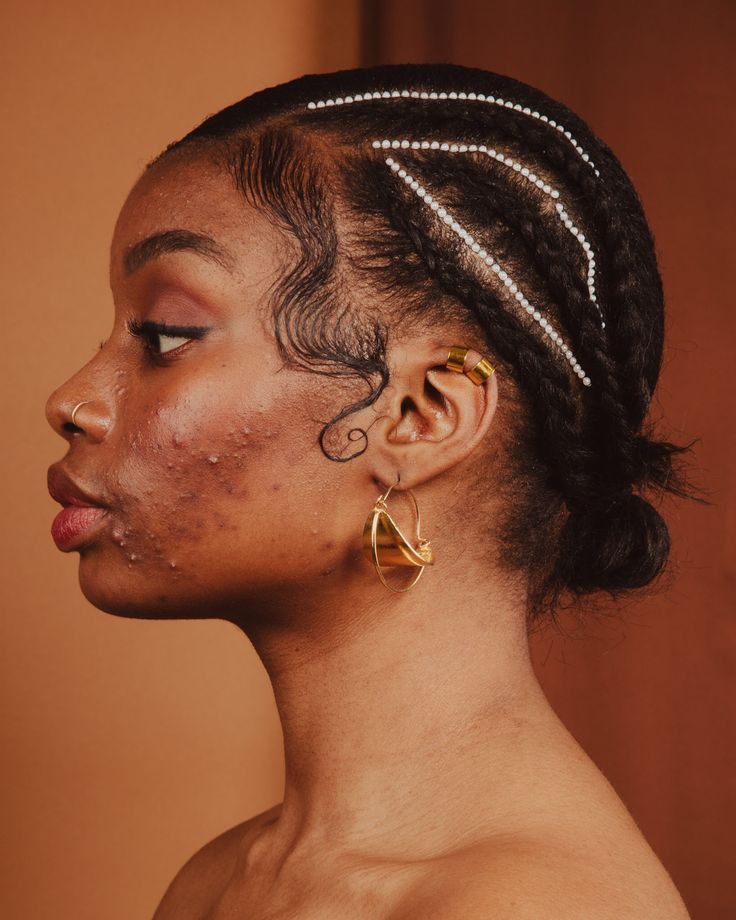As her fingers traced the moles on her face, Precious Sunday sighed at her reflection in the mirror, overwhelmed by the struggle.
Once a confident schoolgirl, the stigma of a face scarred with acne has since muted her colors and forced her to recoil into her shell.
“I never imagined pimples on my face, until I clocked 18 when the pimples started becoming incessant, causing me to worry greatly,” she said.
The curiosity of friends and strangers alike didn’t help matters. “Every day, I deal with questions like ‘What happened to your face?’ when I know absolutely nothing about how the acne covered my face. Now, I don’t go out often like before, and I have used several local medicines and creams.”
During her monthly menstrual period, the moles sprout even more on her face, filling young Precious with sadness. “I don’t like looking at the mirror because of how ugly I look with these pimples covering my face.”
Pimples/Acne
The terms ‘acne’ and ‘pimples’ are often used interchangeably, but they have distinct meanings. While one refers to a specific type of skin blemish, the other signifies an ongoing skin condition with various symptoms, causes, and management options.
Cleveland Clinic, an academic medical center, says pimples are small growths on the surface of your skin that may become inflamed or discolored. Acne typically causes pimples to develop, most commonly on your face, chest, shoulders and upper back. Although acne is a disease, pimples may be a symptom of acne.
What causes acne?
Rebekah Oluokun, a specialist in public health, reckons that hormonal changes associated with puberty are often the cause of acne on a teenager’s skin.
“Most common cases of acne usually start when people attain puberty because of the onset of secreting large amounts of sex hormones, which in turn cause excessive production of sebum in the skin, leading to the development of acne in many.
Several other things are also attached to the interaction of sex hormones, like in women who have Polycystic Ovarian Syndrome and women who take certain hormonal pills. Apart from puberty and hormones playing a role in women, for some acne is related to the normal bacterial colonization of the skin when they infect the follicles and for some it is related to presence of such in their family, also known as genetic predisposition,” she said.
Other contributing factors include medications such as corticosteroids, testosterone, or lithium. Additionally, studies suggest that diet plays a role, with carbohydrate-rich foods thought to worsen the blemish. Although not likely to cause acne, research highlights stress as a possible factor that can exacerbate skin acne.
How acnes affects Adolescent girls
Beyond its obvious damage to the girl’s facial appearance, acne takes a toll on her emotional well being
American Academy of Dermatology, the largest and most influential dermatology group in the United States, explains the emotional trauma associated with acne victims, stating, “In research studies, people with acne have said that their skin makes them feel unattractive, embarrassed, or self-conscious. These feelings can cause some teens to avoid trying out for sports, getting a part-time job, or participating in class. Some people say that having acne makes them feel on edge.”
This well explains the case of Precious, who now finds companionship in her company to avoid being judged by the public.
Given that society places a premium on looks, young people often become self-conscious about their appearance. For some, this includes feeling insecure about the shape of their nose or the size of their thighs. But for people with acne, their insecurity can be even deeper since the face can be hardly hidden from the public. This especially takes a toll on the psyche of women, who are seen as emblems of beauty and admiration.
Rebekah maintains that such a feeling of low self esteem stems from getting overwhelmed with fighting acne. “Studies have also shown that many of them struggle with depression, bullying especially for those in high schools and even in more extreme cases suicidal ideations. Women with PCOS also found that it was one of the major concerns of many of them and it indeed affects their self esteem to the point where many of them do not see themselves as beautiful.”
Triple Action/Antibacterial Creams
The National Agency for Food and Drugs Administration and Control (NAFDAC) announced that about 77 percent of Nigerian women use bleaching creams, some of which are sometimes used to cure pimples.
The director of the regulatory agency highlights several adverse effects of using bleaching creams, including cancer, skin irritation and allergies, and premature skin ageing.
Steroids, which are commonly found in triple effect creams and tubes, should not be used without a prescription and can result in “an excess of the steroids in the bloodstream, which presents with problems like excessive thinning of the skin, easy bruising, purple stretch marks medically known as striae, elevated blood sugar, among others,” Rebekah said.
What should the woman do?
Simple skincare routines and good personal hygiene, like washing hands before touching the face and good aeration of the face, may be helpful, she told Prime Progress.
While mild pimples can often be treated with over-the-counter medication, severe acne lesions may require consultation with a dermatologist or doctor.
Precious Sunday, once a confident schoolgirl, now struggles with severe acne, causing her to avoid social interactions and feel unattractive, especially during her menstrual periods when acne worsens. Acne, a condition commonly triggered by hormonal changes during puberty, is often exacerbated by factors such as medications and diet. Emotional trauma from acne affects many adolescents, leading to feelings of embarrassment, low self-esteem, and depression, as highlighted by the American Academy of Dermatology and public health specialist, Rebekah Oluokun.
Despite common attempts to cure acne with over-the-counter treatments or harmful bleaching creams, experts advise maintaining simple skincare routines and consulting dermatologists for severe cases. The National Agency for Food and Drugs Administration and Control (NAFDAC) cautions against the use of bleaching creams, which pose significant health risks.






